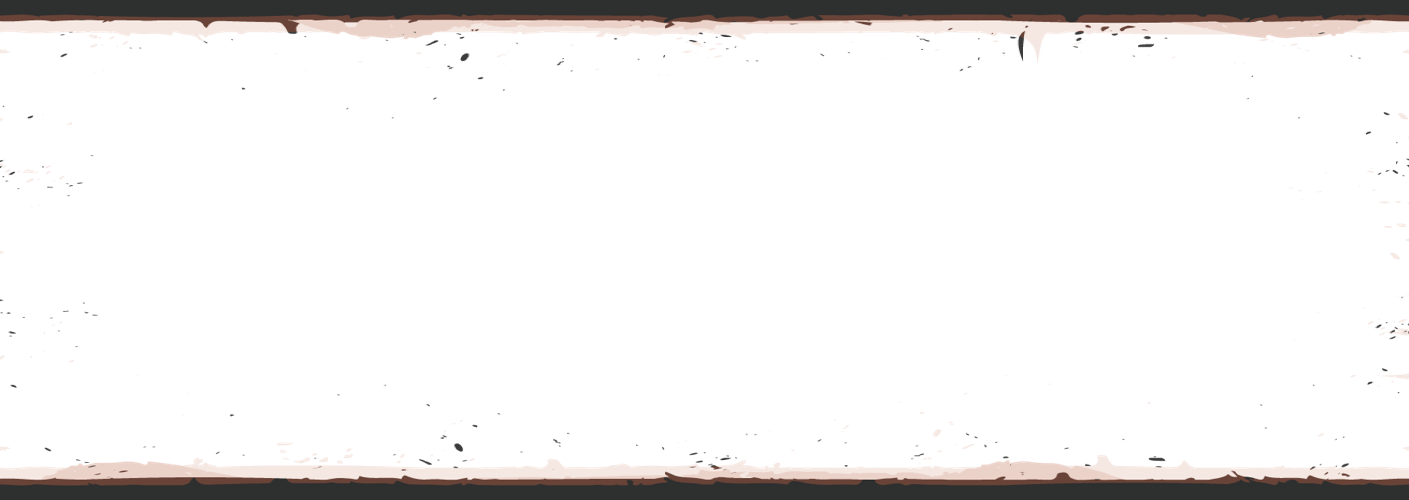Nitshill Memories
Margaret thought that the best things about growing up and living in Nitshill were the friendships she’s made. Recently, she has renewed contact with a group of friends from school, including the Interviewer, which has been great. Family life was good with both of her parents in work, so they did not want for any necessities. There was a good balance in her family life, with her dad keeping them right as to which path to take, and her mum giving a cuddle when needed. In general, she just remembers good times and no bad times, and she’ll always remember them.
Margaret Arnott, Glasgow
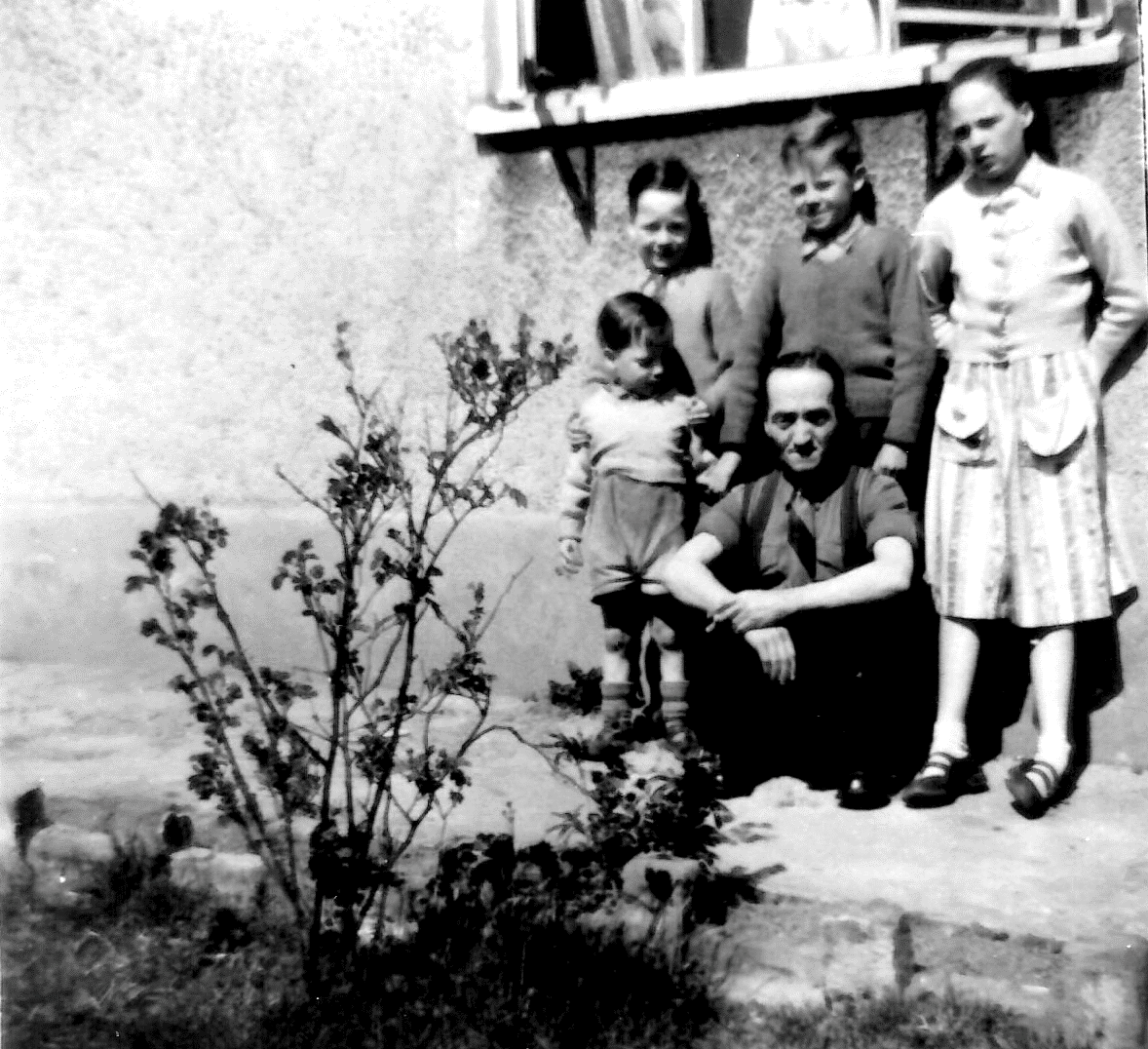
Source: Martin Brady: “This photo was taken in the back yard at our family home, which was 309 Househillwood Road, Nitshill. The date is approx. 1955/1956. In the photo are, top row, left to right: Tony, Daniel, Bernadette; bottom row: Martin (me ) and our father James Brady. The other person you can just see in the photo, in the house, is my other big sister Theresa; I think she was ill and not allowed out.”
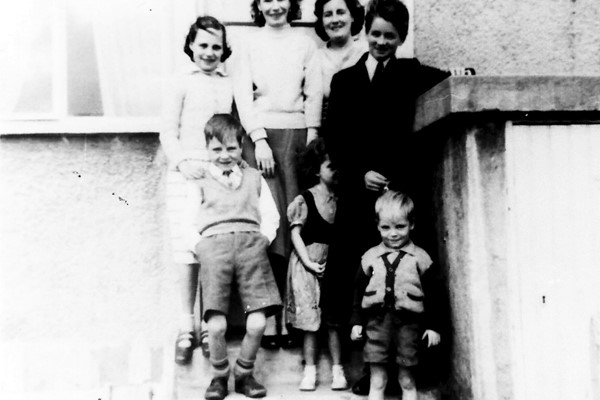
Source: Martin Brady:
“I’m the youngest on the bottom step; on the top row are my sister Bernadette, my Mother, I don’t know the other lady. Next row: my brother Tony, my sister Theresa (hiding), my oldest brother’s future wife – Ivy, wearing her Wrens uniform. The date is approx. 1956, and the occasion was my oldest brother James and Ivy came to Glasgow to get married.”
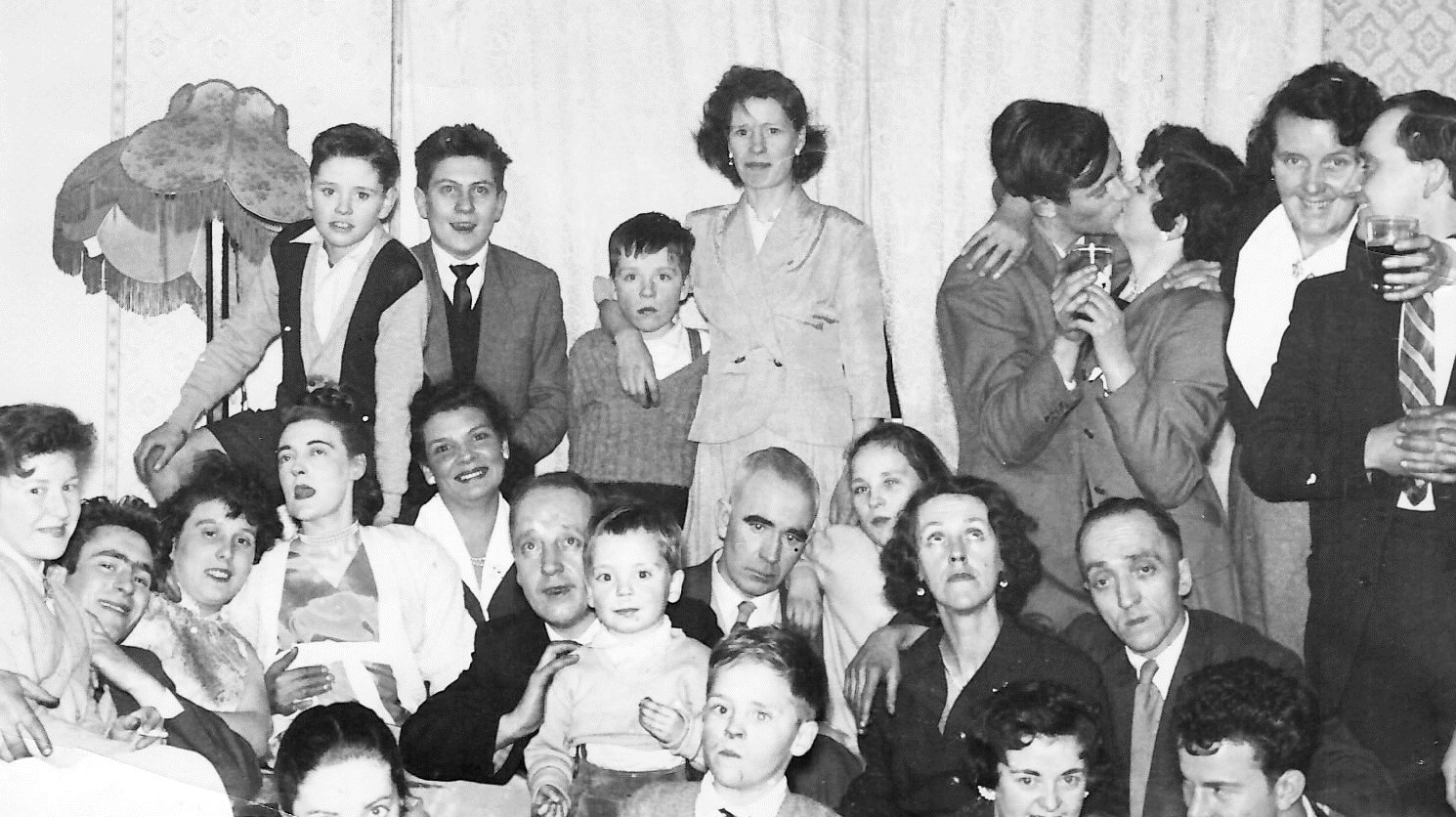
Source: Martin Brady: “This is my oldest brother James and new wife Ivy’s wedding reception held in our living room at 309 Househillwood Road, Nitshill, approx. 1956. I’m just to the left of the centre of the photo.”
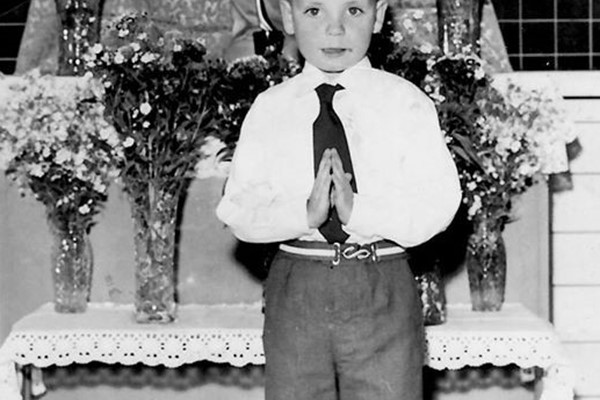
“My first holy communion taken in the old St Roberts Church, Peat Rd., 1960. The building is still there but I don’t know if it is a community hall or some kind of church.”
Source: Martin Brady

Martin, age 3, taken at the top of Peat Road, Nitshill, 1956
Source: Martin Brady
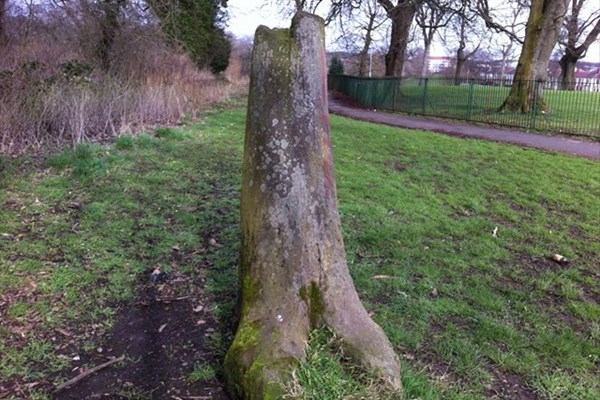
Martin’s father was, for a time, the park-keeper at Househillwood park. He wondered if the ‘stone trees’ were still there. These are fossilised remains and are still in the park. His father was also the night watchman at football pitches in the area and he went down to see him at night to drink tea from a tin can! They went to the social club at St Bernard’s Church at South Nitshill. One of the priests was Father Dunn, who was related to the Dunn’s soft drinks makers. At Christmas they gave small bottles of the drinks to the primary school children.
Martin Brady, Cumbernauld
Rena said there was quite a lot of people from Nitshill who went to fight in the war and who died fighting. Her father was the Fire Warden during the war and No. 2 Dove Street was used as their base. People used to say, “If Jimmy Hunter’s on, we’ll be safe”. Rena’s older brother was in the Navy serving on minesweepers during the war.
My Daddy was one of the founder members of the Bowling Green and Secretary and Treasurer for over forty years. I’m the longest member of the Nitshill and Hurlet Bowling Club. I’ve been a member for fifty-three years. They called my Daddy “Mr Nitshill”, because everything was about the village and the people in it.”
Catherine (Rena) Carlton, Glasgow
Margaret remembers the neighbours in the close. Next door was a Mrs McGhee and her son, Frank. Mrs McGhee had a daughter, whose children sometimes stayed with her. Downstairs was Mrs McDonald, who had quite a few children who were already older and out at work. The other neighbour was Mrs McEwan, who had three children, and also a cat which Margaret hated, as she was terrified of cats. Her family never had any pets. No-one really had pets at that time, possibly because they lived in flats.
Margaret Arnott, Glasgow
Catherine mentions the family’s neighbours:
Mrs Campbell, next door; Mrs Green, downstairs from her; their houses were 4 in a block. Catherine’s family lived in a house attached to another, and Mrs Carmichael was through the wall from them. Mr Ross, a schoolteacher, lived straight across the road from the family. He was a real character and taught most of the family. He was described as “a great teacher”.
Catherine Logue, Glasgow
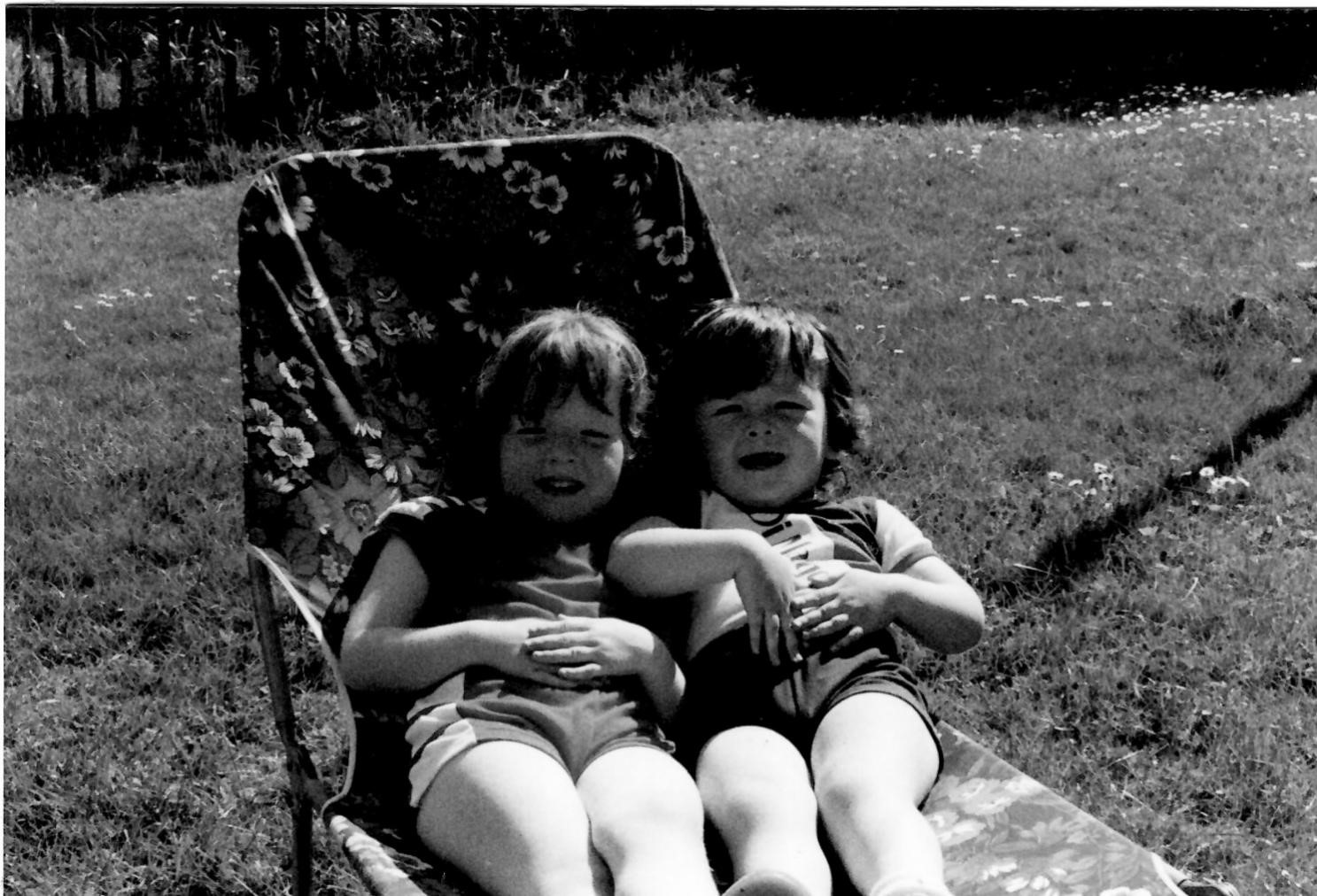
This photo of Catriona and Kevin Stewart, taken in their back garden in Peat Road, was submitted by Susan Rasdale.
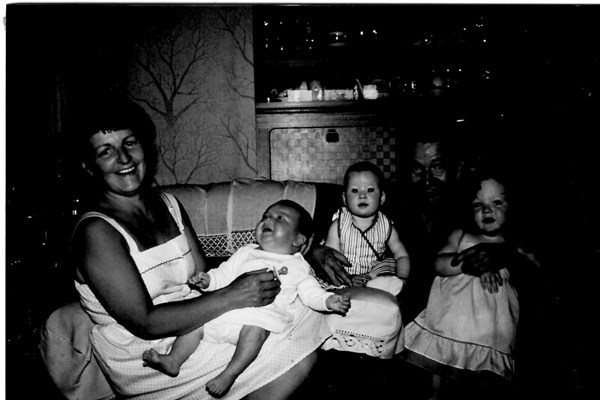
Susan Stewart holding baby Kevin Rasdale, with Pamela McNeil and Catriona Rasdale, at Peat Road.
Carol also remembers lots of neighbours: the McMorlands, a man, his wife and their two adult children; Joe and Jean, a middle aged couple who were a bit hard of hearing and played their music very loud, though the respondent said she enjoyed the music they played. Next door was the Burns family, who separated; upstairs was Pat Sweeney and his mum - Pat continued to live there after his mum died; and the Summers family. On the top floor was Mr and Mrs McTaggart, an older couple.
Mr McTaggart didn’t keep well. I actually remember he fell into the coal fire, and he was a big man, and he used to be a farmer or something like that and, och, he was a poor wee soul, but Mrs McTaggart she went on for years and years. So that’s that, I can actually remember quite a few of my neighbours… My Uncle, my Dad’s brother, stayed in the next block from us on the bottom, but he eventually moved across the road and up."
Carol Borland, Glasgow
Margaret talked about her neighbours. She remembers listening to the upstairs neighbour singing. She said that all the neighbours looked after each other; they were dependable in a crisis, looking after each other’s children.
Margaret Cameron, Barrhead
Through the wall at 44 Maybole were Mr. and Mrs. McGauley, Con and Mary. They were ‘Simply the Best!’ We were friends with them until they died. Mary came to visit us in NJ. After she died, Con sent me a letter saying how sad he was. I still have that letter. Upstairs were the Boyd’s. They were a big family and were neighbourly. We all played together. In the same shared gate were the Hardies, and upstairs from them, the McDonough’s. They were lovely families. Great gardeners, shared their ‘greens.’ An elderly lady, Mrs. McCullough, who lived above McGauley’s, didn’t get out much. When she needed something, she’d open her window, call out to one of us kids saying: “I need you to go to the shops.” She’d throw the list on a piece of paper with the money wrapped inside. No child ever refused."
Marie Hackett (Ashworth), New Jersey, U.S.A.
Coreen and Rosaleen remember living across the landing from an elderly quiet couple, Mr and Mrs Black; and Mrs Dornan, a very kind elderly downstairs neighbour, who helped the their Mum; and a neighbour called Joan, who had a big black cat who had made its way into her home and was quite scary:
Made it under my Mum and Dad’s mattress, we thought it was some sort of poltergeist because the mattress just kept moving and then my Mum and Dad got out and had a look. We didn’t have any pets, so I didn’t know what was making their bed move. The cat was one of these cats that used to hiss at you, so I used to be terrified if it was in the close and you had to pass it. It used to take a swipe at your legs and obviously, we had these wee ankle socks, so we were frightened it was going to scratch your legs…”
"The mattress moved in the middle of the night and he [her husband] thought I was exaggerating and said, “go back asleep”. So, I was lying back, and then my husband lifted up the end of the bed mattress and there was the cat. The cat had gone missing earlier and we were talking, her door was open, my door was open. The cat went “ssshhhh”, so we tried to take it out from under the mattress, and we had to call her up at one o’clock in the morning and her brother to get the cat out. I was standing on top of the bed….Mrs Dornan was a very, very good neighbour. When I was pregnant and came out of hospital, she came up every day and left a pint of milk and scones outside my door, every single day. So, the neighbours were very good, if you were decent to them, they were decent to you."
Coreen McKechnie and Rosaleen McCann, Glasgow
I think it was the neighbours made the place. We all stuck by each other, so we did, and the parents all stuck by each other, and if you had a fight with your next-door neighbour, it was done on that day, it wasn’t carried on or anything. And when I say a fight, I mean when somebody put the washing out on a day they shouldn’t have put the washing out."
Theresa McLaughlin, Glasgow
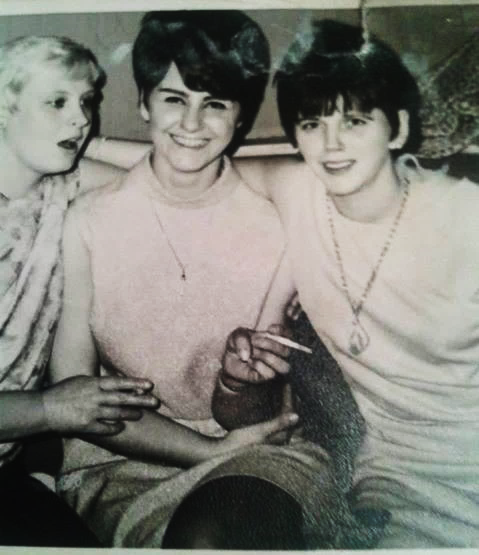
Darvel Street neighbours: Marie Smith, Ina Tierney, and Jean McCormick.
Submitted by Rosie Tierney
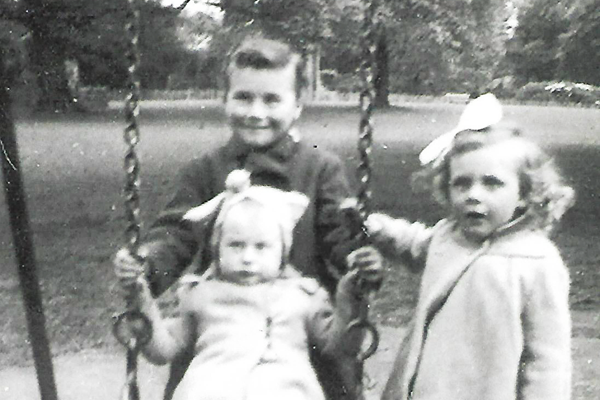
Janette Love pushing the swing with her sister Margaret holding on to the side, and baby sister Iris sitting on the swing, Bellahouston Park, 1953.
Submitted by Janette Aitken.
Letty remembers all of her neighbours. From the bottom of the close they were: the Osbornes, the Paterson’s, her family – the Kerr’s; on the other side of the close, from the top were: the McKenzies, the Bennets, and the Robertson’s. She also remembers the families in the next close:
Because you were all sent out to play, so you got to know everybody, whereas now, kids are in their rooms, playing computers, watching video games, whatever. Things were more sociable then because you went out and spoke to people. It was all families in the closes round about. It was all Council housing, so single people, widowed people, or young couples, wouldn’t have been given that kind of housing. A lot of the people came from areas like Castlemilk, the Gorbals, and the Govan area. When you spoke to people your own age, they would tell you that their grandparents had come from those areas."
Letty Smith, Glasgow
I can remember Mrs Boland coming into our house at New Year and singing The Birth of The Blues. I was only a wee lassie, but I can remember that because that was her party song."
Elizabeth (Liz) Murray, Glasgow
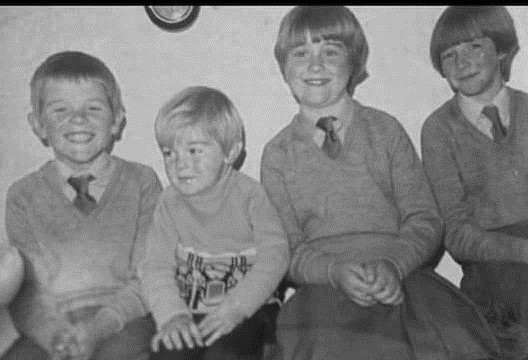
The McKernon children, 1982, Nitshill
“The neighbours were good neighbours, there was Jay Barrett who lived down the stairs; the Mains through the wall and Esther McPhee who lived diagonally down the stairs. They were neighbours for a long time.”
Michael McKernan, Glasgow
